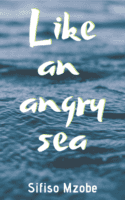Zamani and Khanyi sigh with relief when the rain stops. They open the windows and listen to the roar of water running down drains. The DSTV signal is back on. Reports say there will be no more rain. They watch the coverage of the floods for a few minutes.
“I’ve got to go to Power. I need to see what happened there,” Zamani says.
“I’m coming with you,” says Khanyi.
The township looks like a disaster movie. People are out, surveying the damage in their homes. They clear debris and fallen walls. Wet furniture and carpets are taken out of houses to dry. They drive past people with defeated, sombre faces, overwhelmed by the sight of collapsed roofs and walls, and flooded cars.
The bridge leading to Power has been cordoned off, deemed too dangerous to cross. Zamani parks his car on a pavement some distance away. They make their way to the bridge on foot. They walk past people who are shell-shocked by what they have just witnessed. People walk around with blank stares. There is an emergency services truck near the bridge. They hear the wailing emanating beyond the truck.
“Baba! Baba!” children cry.
“Sthe!” a woman wails.
Zamani knows these cute faces. He saw them across the river and waved to them a few months ago when he was at the construction site with Mlambo. They had a spark about them. Now the spark is gone. They wail while holding on to their mother, who is holding on to the dead body of her husband. Zamani’s heart tears into pieces. Khanyi cannot stand the scene of such tragedy. She runs back to the car and sobs inside.
Zamani recognizes the woman who is taking photos and doing interviews. He has followed her on social media since the video of her pouncing on Ray Mthalane went viral. He wants to approach her but sees her darting past him, crying, and climbing into the emergency services truck.
Zamani heads closer to the river. The water has receded but Zamani is shaken by what is revealed. Pieces of houses. Dead bodies dug out from the mud.
He knows he’d be complicit to corruption if he didn’t speak out about the shoddy workmanship that contributed to the loss of so many lives.
He looks for Amahle in the emergency services truck. She’s wiping the remnants of tears from the corners of her eyes.
“My name is Zamani. I was a site inspector at Power during construction. I have a story for you,” he says.
“Go on,” says Amahle.
“But not here, because this is a sensitive issue.”
“What is it about?”
“Poor construction and corruption and how that has led to loss of life. But not here. And my name and identity must not be revealed.”
“Okay. Let me get your details,” says Amahle.
Screams disturb their conversation. People are pointing to the steep hill where Zamani was a site inspector. There is a crescendo of wailing and screams as houses fall like dominoes down the hill.
“That’s exactly what I’m talking about,” says Zamani. “Don’t take down my details. I’ll find you.”
“Wait a minute,” says Amahle. She switches between looking at Zamani and the devastation unfolding on the hill. “How will you–”
She turns back to Zamani to find that he has disappeared.
* * * * *
Amahle is at her flat. She has dozed off, trying to erase parts of the devastation she witnessed from her mind. The buzz of the intercom shakes her awake. She rouses herself, wishing it was all just a bad dream, but the TV in front of her is showing coverage of the Durban floods.
“Yes,” she says into the intercom.
“It’s me, Zamani.”
“Come up,” she says.
Zamani sits on a chair at the kitchen table and stares into the coffee Amahle has offered.
“Are you nervous?” says Amahle.
“Yes. Yes, I am.”
“Don’t worry. Your identity will be protected.”
“Please make sure of that,” Zamani says and takes a sip of coffee. “People have died for revealing what I’m about to reveal. They kill whistle-blowers like flies here in KZN.”
“I know that,” Amahle sighs. “I’ll protect your identity. You have my word.”
Zamani shakes his head. He has doubts.
Pictures of the twins that lost a father and other people who lost lives and shelter flash across his mind. This is the right thing to do. He begins.
“People lost lives in the floods but it should not have been like that. With proper engineering, places near rivers can be safe. In Power, particularly, those houses should have been properly built. There should have been proper water drainage. Let me explain to you in detail how corruption leads to the loss of lives … ”
***
Tell us: Since reading this story, could you explain in detail, step by step, how corruption can lead to loss of lives?

